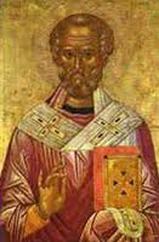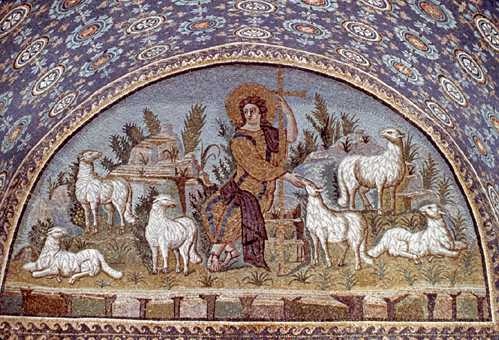
Peter being against his will consecrated Archbishop, arrived at Ravenna, where he was received with great joy by the Emperor Valentinian, the Empress-Mother Galla Placidia, and all the people. And this one thing he asked of them, that, as he, for the saving of their souls, had not refused to bear the heavy weight of the Archbishoprick, so they would strive to follow his warnings, and live in submission to the law of God. He took the bodies of the two Saints, namely, Barbatian the Priest, and German, Bishop of Auxerre, and caused them to be embalmed with rich ointments and honourably buried, and he kept the cowl and haircloth shirt of German for a legacy for himself. At Classis, three miles from Ravenna, he built a Baptistery of extraordinary size, and several splendid churches, in honour of the blessed Apostle Andrew and other Saints. He preached a most severe sermon against the acting and dancing of guisards about New Year time, in which discourse he said among other things, He that jesteth with the devil will never rejoice with Christ. By command of Pope Leo I he addressed an Epistle to the Council of Chalcedon against the heretic Eutyches. He also confuted Eutyches himself in another letter, which is likewise published in the new editions of the Acts of the Council, and is matter of Church History.
When he preached in public his vehemence was such that he sometimes became speechless from excitement. This happened to him once when he was preaching on the subject of the woman who had an issue of blood. The congregation on this occasion were so wrought up, that they filled the whole place with tears, cries, and prayers, and Peter afterwards thanked God, who had turned his failure to the profit of their souls. When he had ruled the Church of Ravenna in holiness for about eighteen years, God gave him knowledge that the end of his labours was at hand, and he returned to his home at Imola, to die. When he arrived at Imola, he entered the church of St. Cassian, and offered upon the High Altar a great circlet of gold, set with stones of great price, a golden chalice and a silver paten. Water poured out of these vessels hath often healed hydrophobia and fevers. Some of the people of Ravenna had followed the Archbishop, but he now dismissed them, with a charge to use great prudence in the choice of his successor. Then he fell to prayer, that God would mercifully receive his spirit, asking the same likewise for the sake of his patron St. Cassian, and so he passed in peace to a better life, on a 2nd of December, about the year of our Lord 450. His holy body was buried, amid the sorrow and veneration of the whole city, hard by the remains of St. Cassian, where it lieth even to this day, guarded with great reverence. One arm was cut off and sent to Ravenna, where it is preserved in the Ursian Church, in a reliquary of gold and precious stones.





